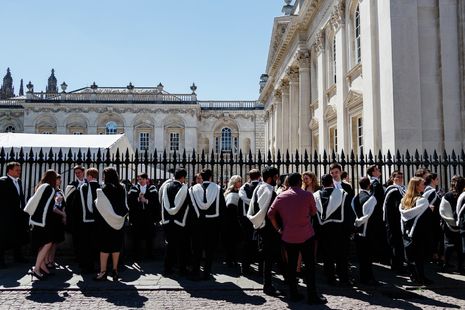Unravelling Cambridge’s “no job” policy
Megan Byrom argues that the Universities policy on term-time employment is worsening inequalities between Cambridge students both now and for their futures

When I moved to University, handing in my letter of resignation was bittersweet. Worries about adapting to university life were standard, but it was my financial worries that were the most overwhelming. At first, I was worried these worries were misplaced but after interviewing the students in this article it seems that in reality, they are far too common.
Cambridge is explicit in its ‘no jobs policy’. According to the official university site, ”students are expected not to work during term-time” due to the intense workload across undergraduate courses. As the number of students from underrepresented backgrounds continues to rise, this universal ‘no jobs’ policy is revealing a tale of two Cambridges, in which the undergraduate experience is becoming increasingly unequal.
“As the number of students from underrepresented backgrounds continues to rise, this universal ‘no jobs’ policy is revealing a tale of two Cambridges”
The disparity arrives from the issues with the policy itself. The ‘no jobs’ rule during term time expects that your maintenance loan will cover everything or that if it doesn’t your parents will make the difference, and if they can’t then you’ll just walk into a job and support yourself at the end of term. For the students I spoke to, these expectations are not just unrealistic — they are unfair.
At any other university, those whose maintenance loan is insufficient to cover living costs would be able to work alongside their studies to support themselves, but at Cambridge, this is not allowed. To combat this, the university argues that they provide funds and bursaries to support those going through financial hardships, but as one medical student I spoke to stated, “The bursaries are great but I feel like I’m stuck in the middle in terms of not being able to have one but needing one.”
These support funds are an inevitable consequence of a no jobs policy, yet many students feel hesitant to ask for support despite needing it. Many of those interviewed wished to remain anonymous, citing their discomfort about discussing money and financial problems within the university so openly. An engineering undergraduate commented that they felt uncomfortable asking for money from the university, “ it’s the mindset I was brought up with of always being self-sufficient and working for yourself.” Stories of humiliation when bank statements are read aloud, judgment by senior staff and the personal details needed to access funds accumulate into a culture of shame about asking the University for financial support.
One student interviewed even believed that colleges actively discourage students from using these funds. Jesus College currently ranks 4th amongst the richest Cambridge Colleges with net assets of £344 million, yet an undergraduate student was told to seek employment rather than take from their hardship fund. They added “despite the obvious academic penalty of a job in easter vacation” the college advised the student to work instead.
A Jesus College spokesperson said: “we would encourage any student who has concerns about their financial circumstances to contact the Financial Tutor where their needs can be looked at in more detail.”
“From October this year, new undergraduates joining Jesus College will have access to an enhanced University of Cambridge bursary scheme to help with living costs.”
“Jesus College currently ranks 4th amongst the richest Cambridge Colleges with net assets of £344 million, yet an undergraduate student was told to seek employment rather than take from their hardship fund”
Whilst Cambridge is clear against working during term time, it is more ambiguous regarding working during the holidays. For some, the vacation period is a time to relax after the intense toll of term time. But for those financially stressed students, there isn’t time to do this because being able to afford life in Cambridge requires a full-time job over the holidays. Charlotte, an incoming second year, is currently working two jobs over the summer period. She said, “ It reduced my time to work on my academics,” wanting to improve her first-year grades, she stated, “I planned to spend the summer revising but I need to work.”
Cambridge terms are prolific for their difficulty. The short 8 week period is overwhelming and, as reported in a poll by the Tab, academic demands exacerbate the mental health crisis at Cambridge. Unlike peers at other universities who are able to spread working hours more evenly alongside their studies, these Cambridge students leave intense university terms for often full-time employment. These students do not rest but instead move straight into jobs, with no time for internships, work experience, and other aspects of the work-life balance the university supposedly wishes students to prioritize.
The expectation placed on employment during the vacation period omits that jobs are hard to find. For students, seasonal or temporary positions are not readily available, especially for those living in rural areas. A second-year medic commented on their job search, arguing that “it was ridiculously hard, especially with covid, as everyone else was also looking for jobs.”
This student highlighted their fears going forward into a 5-year medical degree, adding, “ I was looking at intermitting if I couldn’t get a job and then saving up during that year but they don’t let you intermit for financial reasons. It’s almost like they don’t take it into consideration that not everyone can just afford this uni.” The notion that students can easily slip into employment to support themselves is a privileged one, which for this student, remains an ongoing struggle.
Whilst such inequalities exist across universities in the UK, in Cambridge they are worsened by the lie that getting to Cambridge will be an equalising experience. Poorer grades, less work experience and the inability to take unpaid internships mean wealthy peers move ahead, leaving the rest behind.
If the university wishes to flout its new age of social mobility, transparency and inclusivity with funding are necessary. This includes broadening current bursary schemes, making processes for financial help accountable and lifting the academic burden of research, supervision and work outside of term time. With a collective endowment of £7 billion, Cambridge has the full capability to make a difference for these students, it chooses not to.
Looking to our return in Michaelmas, our directors of studies will inevitably ask what we did through the summer. Not everyone will have the stories of weeks spent travelling, or of getting their foot in the door of a future employer. Instead, you’ll realise the money you’ve made won’t last that long, that there were internships and opportunities you couldn’t take. Even worse, you’re burnt out before term has even begun.
You’ll question whether Cambridge is worth it, if your prospects, your social life, and your mental health might have actually been better elsewhere. But you’ll bury it, under gowns and pretty social media posts, ignoring that feeling no matter how true it may be.
 News / Right-wing billionaire Peter Thiel gives ‘antichrist’ lecture in Cambridge6 February 2026
News / Right-wing billionaire Peter Thiel gives ‘antichrist’ lecture in Cambridge6 February 2026 Features / From fresher to finalist: how have you evolved at Cambridge?10 February 2026
Features / From fresher to finalist: how have you evolved at Cambridge?10 February 2026 Film & TV / Remembering Rob Reiner 11 February 2026
Film & TV / Remembering Rob Reiner 11 February 2026 News / Churchill plans for new Archives Centre building10 February 2026
News / Churchill plans for new Archives Centre building10 February 2026 News / Epstein contacted Cambridge academics about research funding6 February 2026
News / Epstein contacted Cambridge academics about research funding6 February 2026











